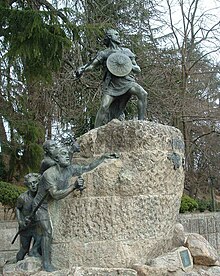Viriato Trágico
Viriato Trágico is a long poem by Portuguese poet Brás Garcia de Mascarenhas (1596-1656).[1][2]

General information
changeViriato Trágico is a heroic poem, one of the most important Portuguese poems of the 17th century. It consists of twenty books. It was first printed in 1699,[3] many years after author's death.[4]
Form
changeThe poem about Viriatus by Garcia de Mascarenhas is written in ottava rima[5] (oitava rima in Portuguese).[6] This strophe was very popular in Portugal in 17th century. It was introduced into Portuguese literature by Francisco de Sá de Miranda.[7] After Luís de Camões used the strophe in The Lusiads all poets emloyed it in long works. The strophe consists of eight lines rhymed abababcc. The lines are composed of ten syllables each.
- Canto um Pastor, Amores, e Armas canto,
- Canto o Raio do monte, e da campanha,
- Terror da Itália, e do mundo espanto,
- Glória de Portugal, honra de Espanha:
- Triunfante da Águia, que triunfando tanto,
- Tanto a seus raios tímida se acanha,
- Que à traição, só dormindo, o viu rendido,
- Porque desperto nunca foi vencido.[8]
Story
changeThe poem tells about an ancient hero, Viriatus.[9][10] He was a warrior from Lusitania (old Portugal). He was famous for his struggle for independence against the Romans.[11] He was invincible in any battle. As the Romans could not defeat him in the open field, the decided to get rid of him by an unlawful deed. Viriatus was assasinated in his sleep.[12] He died, but his fame outlived the Roman empire.
References
change- ↑ "Garcia de Mascarenhas (Brás)". Archived from the original on 2016-03-03. Retrieved 2016-11-28.
- ↑ Brás Garcia Mascarenhas at Portal da Literatura.[permanent dead link]
- ↑ Aubrey F. G. Bell, Portuguese literature, Clarendon Press, Oxford 1922, p. 259.
- ↑ Livro raro - Viriato trágico em poema heróico
- ↑ Ottava rima at Encyclopaedia Britannica.
- ↑ Oitava-rima.
- ↑ Francisco de Sá de Miranda, Portuguese author at Encyclopaedia Britannica.
- ↑ Brás Garcia Mascarenhas, Viriato Trágico, Canto primeiro.
- ↑ "Elena Cueto Asín, Hispania, la leyenda: The Myth of Viriatus' Struggle Transfigured for Television". Archived from the original on 2016-11-19. Retrieved 2016-11-28.
- ↑ "António Manuel de Andrade Moniz, Viriato, herói lusitano: o épico e o trágico" (PDF). Archived from the original (PDF) on 2014-06-05. Retrieved 2016-11-28.
- ↑ "Viriatus: Enemy of Rome". Archived from the original on 2016-12-20. Retrieved 2016-11-28.
- ↑ Robinson, Alex (2015). Alentejo. Bradt Travel Guides. p. 8. ISBN 978-1-84162-568-3.